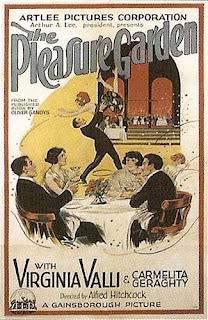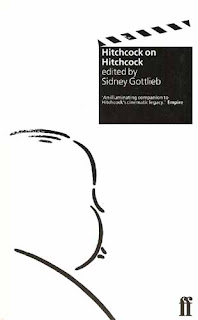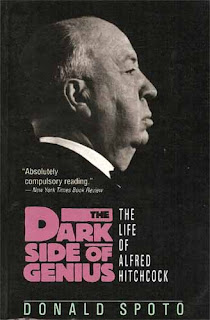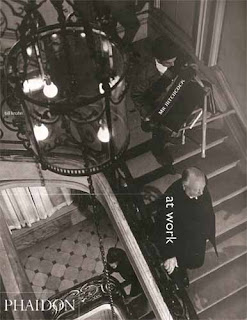
Title: The Lodger (A Tale of the London Fog)
Year: Produced 1926, released in 1927
Studio: Gainsborough Pictures
Screenplay: Eliot Stannard & Alfred Hitchcock
Source Material: From the novel by Marie Belloc-Lowndes
Running Time: 90 minutes
A Silent Picture in Black & White
Saturday 29th May, 9:45am
Due to a rather hectic and social weekend, I had to begin the study of Hitchcock's most famous silent film a little earlier than I had planned. I had already been awoken early around six o'clock due to some rather disturbing dreams and a persistently hungry cat stabbing at my head with her paws. As a naturally early riser anyway, this didn't stress me too much.
I sat on the settee once again wearing my pyjamas (although this time not my Peter Alexander's, but something resembling 'happy pants' and a rather shrunken nightshirt with a Penguin Books logo adorning the chest) and I tore off the previous weeks' notes from the A4 pad, accidentally destroying them in the process. I had intended to watch a bit of TV first, but the programmes on at that time in the morning are either pitifully woeful children's shows or tediously repetitive pop music shows littered with mind-numbingly awful commercials in between. So off went the stations and on went the DVD.
At this point, I need to briefly mention The Mountain Eagle. This was Hitchcock's second movie as director, but sadly, no prints are known to exist, so obviously, I cannot watch it as part of this project. Maybe one day it will be found... along with many lost Doctor Who episodes - one can dream. (Oh, Marco Polo, where for art thou? Marco? Polo! Marco?)
Cast
The Lodger - Ivor Novello
Daisy Bunting - June Tripp
Joe Betts - Malcolm Keen
Mrs Bunting - Marie Ault
Mr Bunting - Arthur Chesney
Synopsis
A girl is murdered on the embankment of the Thames. A crowd has gathered and the police and press are already in attendance. A middle-aged woman is the only witness and she makes the most of her moment in the spotlight and tells her audience the chilling details and describes a cloaked figure with the lower half of his face covered.
The body was found with the murderer's calling card. It is always a triangle with the words 'the avenger' written inside.
The presses roll and the papers are printed. We learn that the poor victim is the seventh in a line of murdered blondes. They are always murdered on a Tuesday night.
We then meet Daisy. She is a fashion model and while she and her colleagues are in their dressing room, they excitedly discuss the news. Daisy takes extra precautions before she heads home by attaching some fake dark curls beneath her bonnet in order to stave off an attack.
Daisy returns home to discover her fiance, Joe, is waiting for her. He is a policeman and he has been chatting with Daisy's parents about the murders. Daisy and Joe have an odd relationship. He is very flirtatious but she plays it cool. Her coy nature is a tease to Joe and he plays along.
The lights flicker and as they search for a coin to feed the meter, there is a knock at the door. We see the shadow of a figure against the woodwork and the number 13 bodes an omen for those amongst the audience who are superstitious.
Mrs Bunting opens the door and lets in this ominous figure before her. He wears a hat and cloak, carries a holdall and has a scarf covering the lower half of his face. He inquires about the room to let and she allows him inside.
His attitude is suspicious and a little unnerving. He pays for his room in advance and asks for the many pictures hanging on the walls depicting beautiful blonde ladies to be taken down.
Joe laughs at these actions and states he is happy the new lodger does not appear to keen on girls.
The lodger also has a holdall which he clutches onto tightly before placing it in a locked cupboard in his lodgings.
After about a week, the lodger has settled in and is more at ease with the family. He is playing chess with Daisy.
Joe arrives at the house to say that he is now on the Avenger case.
He proclaims; "When I've put a rope round the Avenger's neck - I'll put a ring round Daisy's finger!" Daisy looks as though she finds this a little distasteful.
Joe shows off the handcuffs he owns and chases Daisy upstairs and cuffs her playfully. She is not impressed - neither is the lodger.
Later that night, Mr Bunting is out at work (as a waiter) and Mrs Bunting is in bed. It's 11:30pm and the lodger creeps out into the night. Mrs Bunting is wary and suspicious. Where has he gone to? At midnight, he returns, but during that time, another murder has taken place.
Mr Bunting reads about the eighth victim in the paper and Mrs Bunting is even more scared. Joe turns up and discusses the events. While Joe and Daisy's parents chat, a scream is heard. They run upstairs to find Daisy in the arms of the lodger - he was comforting her after she'd seen a mouse. Joe is not impressed and his hatred for this stranger grows.
The lodger visits the couturier's boutique where Daisy works. He sits watching the models parade and he is transfixed by Daisy. The pretty brunette beside him is frustrated by his inattention. He even nonchalantly acknowledges her need of a cigarette lighter by removing one from his waistcoat pocket, lighting her cigarette and then returning it without once taking his eyes off Daisy.
that evening, Daisy receives a package - it is the dress she had been modelling that day - the lodger had bought it for her. Mr Bunting is not impressed and tells the lodger that he won't let Daisy accept gifts from strangers.
Daisy takes a bath (in a very risque scene for its era) and the lodger speaks to Daisy through the door. he wants to make sure she was not offended by her actions and she laughs the whole thing off.
Daisy goes out with the lodger on a date. Her mother is horrified at having let this happen. "...And it's Tuesday night!" she exclaims.
The lodger and Daisy sit beneath a lamp post (at the same location of the eighth victim's demise, it seems) and just before they kiss, Joe finds them. He confronts them both and threatens the lodger. Daisy is appalled and tells Joe she does not want to see him again.
The two lovers retreat leaving Joe to ponder in his misery. He begins piecing together clues and starts to build a case of very circumstantial evidence against the lodger.
Back at the number 13, Daisy and the lodger share their first intimate kiss.
Joe arrives with a warrant and some fellow policemen. They discover the lodger's holdall which carries a gun, a map highlighting the locations of the murders, a selection of newspapers articles detailing the crimes and a photograph of a blonde woman. The lodger states that this is his murdered sister.
Joe is not convinced. The lodger attacks Joe, almost strangling him, but he is restrained and cuffed. As he is led out of the house, the lodger whispers for Daisy to meet him at the lamp post. When Mrs Bunting faints, it's all the distraction he needs and he darts out of the door into the London fog.
Daisy grabs her lover's cloak and follows him out. The police have gone in the wrong direction.
Daisy meets him at the desired location and he tells his side of the story which we learn about in flashback. His blonde sister was murdered at her coming-out ball. His mother never fully recovered from the shock and on her deathbed, she asked her son to find the killer.
Swear to me, my son, you will not rest until the Avenger has been brought to justice.
So he studied the crimes in order to catch him.
Daisy takes the lodger to a bar, keeping his handcuffed arms hidden under the cloak, and feeds him brandy. The attempt at subterfuge is futile and the bar patrons are immediately suspicious. The two leave just moments before Joe and his colleagues turn up. Whilst on the phone to his superior, the crowd at the pub learn that it must be the two strangers whom the police are after and as one mob, pile into the street in pursuit. What they don't overhear is Joe learning from his superior that the real Avenger has been caught red-handed.
Joe, reeling from the shock of his mistake, flees the establishment to find the lodger before the angry mob get to him.
The lodger is running or his life. He climbs over a fence/railing over which the other side is much lower. His cuffs get caught on the spikes and he is stranded, dangling down and vulnerable. The mob reach him and some are beating him from above and there's a second crowd beating him from below.
Daisy desperately tries to reach him, she sees his face as he becomes weaker. Blood trickles from his mouth.
Joe arrives and pushes his way through the crowds, eventually reaching the innocent man and retrieves him from his mock-gallows just in time.
The opportunistic newspaper boy arrives with the papers declaring the real killer's identity and sells them to the horde.
As a coda, we see the lodger recovering in hospital and eventually back at his real home in London, a large house, indicating his wealthy background. Daisy and her parents are there and the two announce their engagement much to the acceptance of the Buntings.
The End.
Great Lines
Newspaper Boy: "Always happens Tuesdays - That's my lucky day."
Comments between the models in their dressing room: "He's killed another fair girl." "No more peroxide for yours truly."
When the landlady (Mrs Bunting) suggests that leaving money around the place is tempting providence, the lodger replies; "Providence is concerned with sterner things than money."
Comments
What a pity the movie poster depicts the climax. That's not the smartest of marketing ploys. Fools.
Although the character of the Lodger is never named in the film, Alfred Hitchcock would often refer to him as Jack the Ripper and the similarities are obvious.
The opening shot of a young girl screaming is magnificent. It gets you in immediately. The repetition of 'To-Night Golden Curls' book-ending the movie is a nice touch.
Joe and Daisy are ill-matched in my mind. She is beautiful - he's a bit weird and creepy, frankly. One can see why she fancied the lodger!
One magnificent scene comes early in the film when, below the new lodger's rooms, the other inhabitants can hear the lodger pacing his room. The small chandelier sways beneath the rhythmic pace and they envisage his footsteps above them - this is displayed for the audience in a beautifully inventive glass-floor fantasy shot.
There are a few red-herrings throughout including a great moment when the lodger is playing chess with Daisy. She leans down to pick up a fallen chess-piece and he reaches for the poker by the fire. We imagine he is going to strike, but he merely pokes the fire. Earlier we had even seen him flick something off Daisy's clothes with a butter knife. Maybe he was paying attention to some minor detail or perhaps this was his clumsy notion of foreplay - who can say?
When the lodger creeps out into the night, he descends the staircase. We look straight down the gap of the spiral in a shot which would become familiar to film makers and viewers in the future - foreshadowing Vertigo and others.
At the rendezvous when Daisy chooses the lodger over Joe, there is a beautiful tableaux of emotion in the frame - the lodger looking victorious, Daisy defiant in strength and love, Joe a vision of despair.
Daisy and the lodger's first kiss (65 minutes into the film) is cinematic brilliance. It is a slow build like extended foreplay. They tease each other and the audience as they keep getting closer. We then are the eyes of Daisy as the lodger's face looms towards us. The big moment with the two of their almost perfect profiles interlock is mesmerising and exquisite. Hitchcock was always brilliant at sexual tension and this was the first moment of genius depicting such erotic art.
The question is; just who was the Avenger and what was he actually avenging? Brunettes?
One important note is that in the novel, the lodger is the killer, but Ivor Novello was such a matinee idol, it was thought best not to have him play a bad guy.
This is not the last time a hero is rewritten for the sake of face for the producers and their audience. It will happen again most notoriously when Hitchcock makes Rebecca, but more of that when the time comes.
My Verdict
As I said previously, this is Hitchcock's most famous silent film and it is easy to see why. It has a very accessible plot with some wonderfully eerie moments. The most frightening of all is the lynch mob who, still lively from their evening's drinking, make the most terrible errors of judgment. (Joe has no excuse. His demons were pure jealousy.)
Ivor Novello has been described as camp, but I think that is rather unfair. I thought (with hindsight)that his depiction of a broken and weary hunter was astute and accurate. June Tripp is simply beautiful as Daisy but it's Marie Ault who is most convincing as Mrs Bunting. Her performance as the scared, paranoid woman fearful for her daughter and the mysterious lodger is rather impressive.
Once again, we see future tricks of Hitch's come into play with no end of shadows lurking in the corner of our eyes or emblazoned across the screen.
Although their are some loose ends, the plot is rapid and entertaining. 7/10







